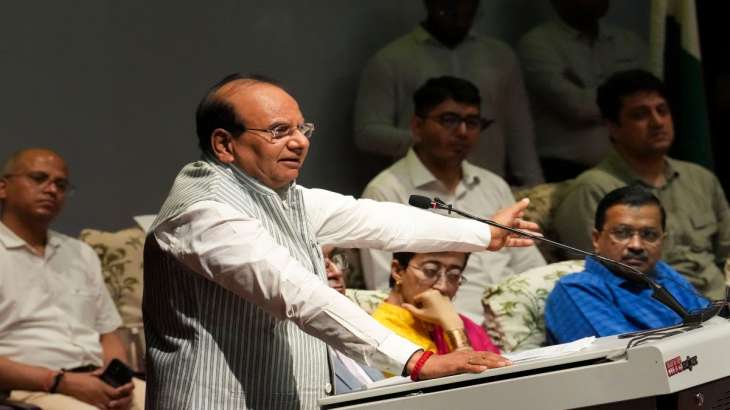
The tables turn on the ordinance: The ordinance dispute between the Center and the Delhi government took a new turn on Sunday (July 16) with the Congress playing spoilsport for the Center and declaring support to the Arvind Kejriwal administration, killing two birds with one stone. . The move by the Congress not only cleared the way for the Aam Aadmi Party’s participation in the joint opposition meeting in Bengaluru, but also raised concerns over the passage of the bill in the Rajya Sabha, which earlier seemed easy for the government.
The AAP has been demanding that the Congress clarify its stand on the Centre’s ordinance on deregulation of services in Delhi. Both the parties attended the opposition meeting in Patna on June 23, following which AAP made it clear that it would attend the next meeting only if the Congress clears its stand. At that time the Congress had said that it would take a decision on the matter before the start of the monsoon session of Parliament, which begins on July 20.
However, on Sunday, Congress general secretary KC Venugopal announced the party’s support to Kejriwal. “Our stand is absolutely clear as far as the ordinance is concerned. We are not going to support it.
Number game in Rajya Sabha
The ordinance, when introduced in the Lok Sabha as a bill, will not hinder its passage much as the BJP holds a majority of seats in the house, however, when it will be introduced in the upper house – the Rajya Sabha. It all depends on the numbers game of the government and the opposition.
The BJP and its allies – the NDA – together have 109 MPs in the Rajya Sabha, which means the government will need outside support (opposition parties to vote in favor) to pass the bill.
Currently, the opposition has 128 MPs, of which 31 belong to the Congress.
Had the Congress decided to support the ordinance, which was highly unlikely, it would have been an easy task for the BJP government to get the bill passed. However, now that the Congress is opposing the government on this matter, the tide has turned and the government has to brainstorm.
Arvind Kejriwal is visiting various states to seek the support of opposition leaders in the Rajya Sabha against the ordinance. In the process, he met Mamata Banerjee, Uddhav Thackeray, Sharad Pawar, Akhilesh Yadav, KCR and MK Stalin, among others, who assured him of their support in the Upper House of Parliament.
So far, he has secured the support of around 70 MPs from the opposition ranks including 12 MPs from TMC, 10 from DMK, 7 from BRS, 6 from RJD, 6 from CPI(M), 5 from JD(U), 4 from NCP . 3 from Uddhav Thackeray-led Shiv Sena, 3 from SP, 2 from CPI and others. Now, even after Congress extends support to AAP, Kejriwal needs support of other parties like YSRCP, BJD to stop the bill.
History of Opposition’s Voting Pattern on Major Bills
In August 2019, the Rajya Sabha passed the Jammu and Kashmir Reorganization Bill despite opposition from several parties. Despite heavy protests inside and outside the Rajya Sabha, the vote was essentially one-sided.
Only 61 MPs opposed this bill, in whose favor 125 votes were cast.
Citizenship Amendment Bill- When this bill was put up for voting in the Rajya Sabha, the unity of the opposition was at its peak. The BJP got 125 votes, while the opposition managed to garner only 105 votes. After this Shiv Sena decided not to vote in Rajya Sabha.
Parties that can support the government in the Upper House
If the government has to pass the bill in the Rajya Sabha, then it needs the support of the opposition parties. It will rely on parties that have voted in favor of the government in the House in the past, including the Naveen Patnaik-led Biju Janata Dal (9 MPs) (voting for the triple talaq bill), the Jagan Mohan Reddy-led YSRCP ( 9) were involved. Lawmaker) (voted for NDA candidate in Presidential election in 2022), and BSP (1 MP) (voted in favor of government during abrogation of Article 370 in 2019).
The TDP, led by former BJP ally Chandrababu Naidu, also has 1 MP in the Rajya Sabha, while the JD(S), led by former prime minister HD Deve Gowda, has a lone MLA in the Upper House.
If all these parties cast their vote for the government, the numbers add up in favor of the government, making the number more than half.
The BJP will once again hope to get the support of the BJD and the YSRCP in the House, which would mean the road for Kejriwal to get the opposition’s support for the ordinance would be over.
However, it is not yet clear whether the government will introduce such a bill in the monsoon session of Parliament beginning July 20. However, if the BJP avoids returning to power for a third consecutive term and votes for Kejriwal to prevent the opposition, which is trying to forge an alliance for the 2024 Lok Sabha elections, it could lead to the government moving forward on the bill. The road to growth can be difficult.
read this alsoBJP’s counter-strategy on key motivations ahead of 2024 polls amid Opposition unity bid
Read this also | Parliamentary panel chief Sushil Modi pitches for keeping tribals out of UCC purview: Sources